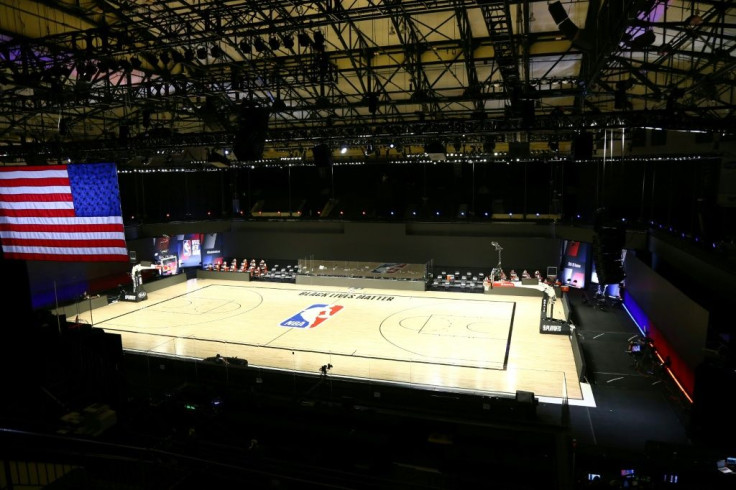NBA Boycotts Supported By Most Adults, Democrats
A majority of adults in the United States support the decision of NBA players to boycott games in the wake of the shooting of Jacob Blake, a survey indicated amid growing questions about the league’s involvement in social justice issues and how it might affect popularity.
The Milwaukee Bucks refused to take the court for their first-round playoff matchup with the Orlando Magic Wednesday. The Houston Rockets, Oklahoma City Thunder, Los Angeles Lakers and Portland Trail Blazers all followed suit and chose not to play their scheduled games later that night.
Among 7,425 U.S. adults surveyed, 45% said they strongly support the players’ decision, YouGov reported Friday, while 12% of adults said they somewhat support the boycott. The research data and analytics group found 21% of adults surveyed strongly opposed the actions of the players, and only 7% said they were somewhat opposed to it.
NBA players debated the possibility of canceling the season, but voted to continue the playoffs Thursday. Games were expected to resume this weekend.
On Thursday, players received a commitment from team owners to do more “work on real action items that would benefit the Black community,” Yahoo Sports reported.
Social justice has been at the forefront of the NBA’s restart in Orlando, Florida. Before agreeing to end the indefinite suspension of the season that started because of the coronavirus pandemic, players made sure they would be able to use their platform in the league’s bubble to support the Black Lives Matter movement and demand justice for those who have been victims of police brutality.
The NBA has drawn the ire of some, most notably conservatives, for kneeling during the national anthem and bringing politics into sports. Opponents of the league’s direction have linked these actions to declining television viewership.
Only 10% of Republicans surveyed strongly support professional athletes publicly expressing their political opinions, the YouGov poll indicated. Two-thirds of Democrats strongly support athletics expressing political opinions, and only 4% of Democrats strongly oppose it.
“I don’t know much about the NBA protests,” President Donald Trump told reporters Thursday.
“I know their ratings are very bad because I think people are a little tired of the NBA, frankly. But I don’t know too much about the protests, but I know their ratings have been very bad and that’s unfortunate. They have become like a political organization. And that’s not a good thing. I don’t think that’s a good thing for sports or for the country.”
Generally speaking, do Americans support or oppose professional athletes publicly expressing their political opinions?
— YouGov America (@YouGovAmerica) August 28, 2020
Strongly support - 43%
Somewhat support - 17%
Somewhat oppose - 9%
Strongly oppose - 21%https://t.co/3phhHkDBwM pic.twitter.com/GtQn3gjqnQ
Trump and the NBA have been at odds for most of the president’s time in office, but it isn’t just the league’s critics who believe it has a viewership issue. While NBA commissioner Adam Silver has said he isn’t concerned about the ratings, the league appears to be wary of waning interest.
The NBA proposed several changes to the schedule earlier this season. A midseason tournament and fewer regular-season games were among the ideas.
The return of basketball after a 141-day hiatus hasn’t sparked the ratings boom for which some had hoped. The number of fans who were starved for live sports for the first few months of the pandemic might have been overestimated.
The first week of the NBA playoffs averaged 1.875 million viewers, down 20% from last season, per RealGM and ShowBuzz Daily. Heading into the 2019 NBA Finals, the playoff ratings were down 14% from the previous year’s postseason.
Since the 2011-12 season, TNT’s average NBA viewership is down over 40%, The Athletic reported. ESPN’s NBA viewership was down roughly 20% during that time.
Exactly why the ratings are down and if they’ll continue to drop is up for debate.
This year’s playoffs started in August for the first time, and unlike recent seasons, some games are being played during the early afternoon in the middle of the week. Some blame injuries to superstars, including Stephen Curry and Kevin Durant. Overall TV viewership is down due to cord-cutting, which has likely affected the NBA.

© Copyright IBTimes 2025. All rights reserved.






















